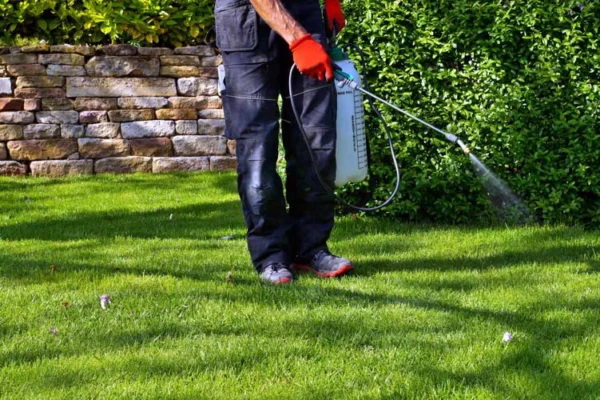There’s no single answer when it comes to managing weeds in your lawn. To get the best results, it’s important to evaluate your lawn’s unique needs before choosing a weed control solution.

Key factors to consider when selecting a weed killer include:
- Weed Types: Identify the specific weeds in your lawn to choose the most effective treatment.
- Infestation Level: Assess how widespread and dense the weed problem is before applying a solution.
- Grass Type: Different grasses react differently to weed killers, so select one that won’t harm your lawn.
- Weather Factors: Consider the season and climate, as some weed killers work best in certain conditions.
- Safety Concerns: Choose a weed killer that is safe for pets and children.
It’s not always easy to find a weed control solution that checks all the boxes, but lawn care experts can guide you. They’ll help you choose the right herbicide while also suggesting natural alternatives to limit chemical dependency.
Need Lawn Care? We Can Help.
Click the button below to leave your information & we'll be in touch in an hour or less.
Common Types of Herbicides
With so many herbicides and weed control products available, researching your options is key to making the right choice. To simplify your decision, here’s a breakdown of the most common weed control solutions:
- Selective Herbicides: These target specific weed types while leaving other plants unharmed, making them ideal for treating broadleaf weeds in lawns.
- Non-Selective Herbicides: These kill most plants they come into contact with, including desirable ones, and are best for clearing vegetation in areas like sidewalks and driveways.
- Contact Herbicides: These only affect the plant parts they touch, making them useful for spot treatments.
- Pre-Emergent Herbicides: Applied before weed seeds sprout, these help prevent weed growth, especially for annual weeds.
- Post-Emergent Herbicides: Designed to kill existing weeds, these can be either selective or non-selective, depending on the formula.
- Systemic Herbicides: Absorbed by the plant and distributed internally, these are effective for eliminating deep-rooted perennial weeds.
Consider Professional Weed Control
Using chemical herbicides requires care, as an incorrect formula or improper application can damage your lawn. To achieve the best results, ensure the product you choose is suited to both your grass type and the weeds you’re targeting.
If you’re unsure where to start or need assistance in choosing the right weed control solution, consulting a lawn care specialist is a smart move. Their expertise can help you select the best method for your lawn while ensuring safe and effective treatment. They can also provide long-term strategies to prevent future weed growth and maintain a healthier lawn.
